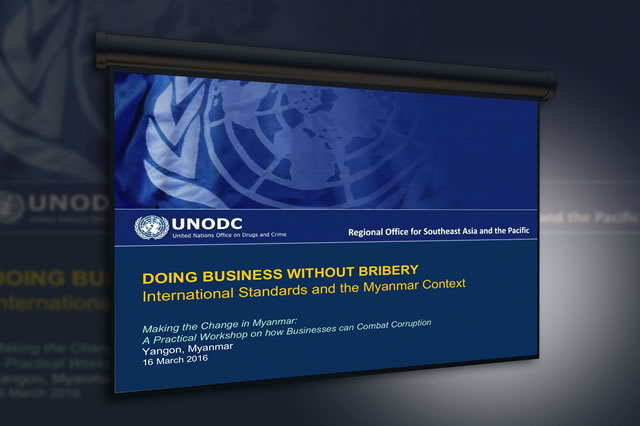Companies Discuss Corruption in Myanmar and How to Combat it

On 16 March, the Myanmar Centre for Responsible Business (MCRB) and ASEAN CSR Network (ACN) hosted a workshop in Yangon for senior managers of Myanmar companies on anti-corruption practices.
The event, titled “Making the Change in Myanmar: A Practical Workshop on How Businesses can Combat Corruption,” was attended by more than 120 participants from around 60 companies, as well as other organisations interested in addressing corruption in Myanmar. The workshop was held to discuss the challenges companies face with regard to corruption and assist in the development of anti-corruption programs.
Despite recent political and economic reforms in Myanmar, persistent corruption remains a major impediment to efficiency and success for Myanmar businesses. According to a 2014 survey, Myanmar businesses identified corruption as their most common business constraint. While some Myanmar companies have adopted anti-corruption programs, many more lack anti-corruption policies and procedures for addressing this problem.
The workshop, which was organised in partnership with the Union of Myanmar Federation of Chambers of Commerce and Industry (UMFCCI) and Global Compact Network Myanmar was supported financially through the Prosperity Fund of the UK’s Foreign & Commonwealth Office. Participants, many of whom are members of the UN Global Compact (UNGC), were able to discuss how to make a reality out of their commitment to the 10th principle of the UNGC which states that “Businesses should work against corruption in all its forms, including extortion and bribery.”
Speakers at the workshop included the ASEAN-CSR Network Trustee and Joint Secretary-General of the UMFCCI Daw Khine Khine Nwe; Chair of the UNGC Myanmar Local Network, Dr Aung Tun Thet and UMFCCI CEO U Tint Swai. There were presentations from Transparency International Malaysia and the UN Office on Drugs and Crime (UNODC) as well as local NGO, Spectrum. Company speakers included local companies SMART and Max Myanmar, and international companies Standard Chartered and Coca Cola.
Presentations and the Press Releases are available here:
They were also polled on where they are most likely to encounter corruption in their business and personal lives. The most commonly reported instances of bribery had to do with paying income tax or government licenses and tenders. 27% of participants most often encountered bribery while dealing with ministries on license or tenders, while another 27% said the same of income tax offices. Another 15% of respondents identified Yangon City Development Committee (YCDC) as soliciting bribes, and 14% identified the customs office.
Respondents were also asked where they encounter corruption in their personal lives and identified, where YCDC (24%), immigration offices (24%), and traffic police (21%) topped the list.
Read also
- Handbook on Business Integrity for Myanmar Businesses
- ‘Tone from the Top’ is Essential in Combatting Corruption
- Combatting Corruption in the Private Sector – Regional and Myanmar Developments
- Anti-Corruption Scores Have Improved Under the NLD Government
- Workshop on Building Business Integrity Co-Hosted by MCRB and UNODC
 English
English မြန်မာ
မြန်မာ မြန်မာ (unicode)
မြန်မာ (unicode)
















